QUEERY is a show hosted by Cameron Esposito which is about sexual diversity and identity. The show had Rebecca Sugar on as a guest to discuss her own identity and the queer-positive messages she incorporates into her art.
You can listen to the episode here.
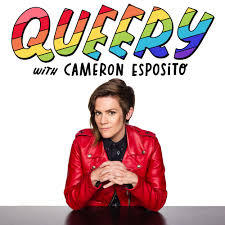
To be honest, I wish I could interview Rebecca about this (or really just have a conversation about it). We're both queer Jewish creative-workaholic female creators and I've been saying some of the same things she says in this interview for literally years, and it’s just so amazing to hear someone else saying them.
I’d love to have a discussion of how both asexual and bisexual people get the “not queer enough” treatment sometimes and are accused of doing it for attention or co-opting resources meant for “real” queer people, and how very very very important it is to see ourselves in our media so we know we’re real and not alone. The stories we tell are how the world talks to itself, and if you’re not represented there, you feel like you’re not part of the world or its stories. We should all be able to be part of that. As a queer creator myself, I'm finding that I want and need to incorporate that underrepresented perspective into my writing, and the experience has so many nuances and unexpected aspects that I wish I had someone to talk to about. That and how not all important relationships are romantic; friendship is always sidelined and represented as lesser, but I think friendships are properly represented in her work and I appreciate it so much.
I’ve also had the same experience Rebecca had with going to a college campus (where I was a speaker) and hanging out at the LGBT Center with a group of kids who have the kind of community I never had when I was that age, and I’d always thought I didn’t need it, but being there with people who all had this thing in common and knowing it’s a place you can be you, I think I had a weird mourning feeling tied up in gratefulness that this generation has more support than I did.
Some details of the interview:
Cameron introduces Rebecca's show, Steven Universe, to her audience, and says if you’re not watching it you should be. After some info on the tour she’s doing at the moment, she has Rebecca Sugar introduce herself.
Cameron compliments the show and discusses the music Rebecca writes and plays on ukulele. Rebecca discusses how she did comics and studied animation but music was really a hobby. She was surprised that she got to incorporate that into the show. She used to do busking in an eight-person band, playing the banjo ukulele, like in the subways and stuff. They discuss street performance and puppetry for a bit.
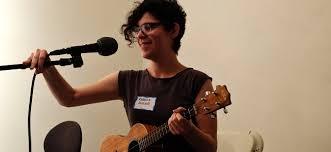
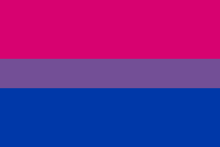
She didn’t want to give the impression that she was ashamed or sad about it just because she cried—she loves being able to be open about it. For a long time Rebecca thought she wasn’t allowed to talk about it, and hadn’t even considered being out. I had the same feeling about it, and that was reinforced by people telling me “Why do you need to talk about this? This should be private.” And yet they did not understand how casually, how freely, how without fear heterosexuality was inserted into everything they did and said, from facing no qualms about saying who they thought was hot in a movie to casually talking about their partner without worrying it would make someone think differently about them or even be dangerous.
When Rebecca was a kid, other people’s responses were mostly like “you can be with whoever you want.” So she figured the floor was open. She hasn’t dated much and is shy, and now she’s with Ian (who’s a man), so since she wants to spend the rest of her life with him, she figured she would never really have the opportunity to “be out” because her relationship is with a man and people don’t really interpret that as queer. She said she thought she would only need to be out if she was with a woman.
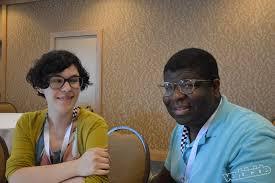
Rebecca wants to reach people on this subject—and it’s new to her to be able to reach people on this subject!—so she’s very excited to be able to explore it also in her cartoon. She suggested that a hundred thousand children “knew she was gay” (though “gay” isn’t exactly it), but she hadn’t had that conversation with her family.
She wanted to base the stories on her own experiences, but at the same time she wasn’t sure anyone else would relate to it. She also discussed how if bi people talk about their identity, they want attention or want to be cool or sexy. She said that didn’t fit at all with the way she felt about being bi. She mostly felt worried that by being in a relationship she was just a liar all the time.
Cameron spoke up to say proof or external representations don’t dictate identity. Elaborating, she says that her being gay herself has nothing to do with her wife, Rhea, but at the same time it has plenty to do with her because Rhea is in her life.
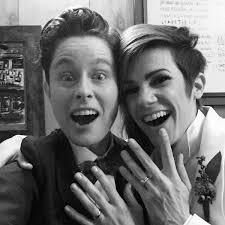
And now she’s become free to explore it, and she’s so free to connect with these kids who relate to stuff in her cartoon who knew about it more than she did, all these queer kids who get it.
Cameron discussed issues in the queer community from there, discussing how people make choices about their identity and how they present to the world, and who they should be with. Being a lesbian, that doesn’t mean she has to be with a cis woman out of fear that someone will disqualify her from the lesbian community if her partner is trans. The boundaries are relaxing. Rebecca agrees and says things are shifting on the spectrum.
They agree also that “Oh who cares, I don’t care what your label is” is “cruel by accident.” Rebecca says that’s kind of what made her want to say she does care—through her platform and her cartoon, she wants to speak to kids that she personally does care and is interested.
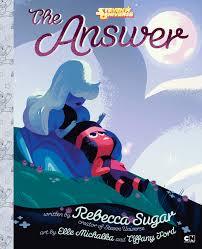
I related to this a lot. When I did a video on asexual representation in comics and books and TV, a few people went after me like, “Why do you have to insert this into everything, why do you have to see it? And what about the gay kids who are afraid of being gay so they think they can just be asexual and not have to face it?” But never do you care about what happens to ace teens when they have nothing. We should NOT be told we can’t talk about who we are or have representation because someone, on the path to discovering themselves, might mistake themselves for one of us along the way.
Rebecca says she knows lack of representation meant she rushed into things with other people because she needed a partner to “explain things” to her. She learned quickly that people expected her to “find out” who she was by experimenting even though she didn’t really want to date a lot of people, and she eventually figured she’d learn to define herself based on who she ended up dating.
She was maybe as young as 11 when she discovered she was bi, and people would reply to her with “oh please.” At 14 she thought she must “want to be” bi because she didn’t date other women. And yet she didn’t get to be out until she was 28.
She felt she just couldn’t say she was bi. She didn’t want people to think she only wanted attention. What you learn when you hear that is that your partner matters and your feelings DON’T matter.
Cameron agreed that “you want attention” is common across the board with queer people. Like why would you need to talk about it? But Rebecca says everyone tells stories about their lives. People criticized Cameron’s work and said why do you need to talk about your experience, expecting not everything would come through her experience, when of course it would.
The commenters on Cameron’s column on AV Club got super cruel after a while, expecting her to make her column have more diverse perspectives even though it was only ever supposed to be her own, as if they were angry that a lesbian had a platform and the content on it made her identity integral. She stopped writing it because of how brutal the comments got.
Rebecca said she now wants to champion LGBTQIA stuff in G-rated entertainment, and now wants to get into talking about her own perspective and championing it at the beginning of children’s lives. When she first started doing this, her loved ones cautioned her to be careful since she might be endangering herself being out, especially since people are threatened by those trying to get the information to kids. It frustrates her that her loved ones were reacting with worry as their first response.
That happened to me too. The first time I was invited to be on television, two people pounced on me with concerns about my safety, and they successfully scared me into backing out of the media engagement. I have since gotten this managed and safely appeared in visual media, though I also acknowledge the appropriateness of the concern because some of my treatment has been frightening and awful.
In discussing her orientation in her relationship, Cameron asked Rebecca if she’d had much discussion about it with her partner. She brought up a time when the show had recently been released and a couple of girls asked her at an event if she was gay, but her significant other was next to her and she felt she couldn’t say “yes,” she couldn’t say “no,” she just really had no answer because she didn’t know the answer herself.
She felt very strange and exposed being interpreted as queer, though she sometimes pointed at her relationship with a man, and she was afraid that confirming she’s bi would mean she’s admitting she’s attracted to women and that means she can’t be with a man. She wasn’t ready to face that but she could make art about it.
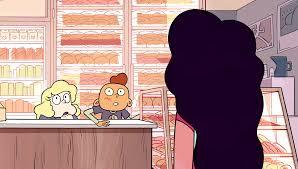
I relate to this very hard. “Coming out” is not something you just do once, and though people have a common misconception that asexual people don’t need to do it, you would be surprised how often it’s relevant. Especially for a perpetually single woman of childbearing age, for whom everyone is always demanding a reason, as if being in a relationship is the default and you must have an excuse if you aren’t. That or they think they’re doing you a favor by giving you advice, assuring you you’ll find someone, or trying to set you up with their brother.
Rebecca brought up getting a letter from a queer group at a college, discussing the importance of community and how her show meant so much to the students there. On the surface she was thinking of it like she’s been doing a favor for people who need help but don’t have anything to do with her, because hey, who cares about labels, but at the same time she got really emotional while reading the letter, saying she didn’t have the opportunity to connect to community herself.
So she decided to go visit, and she came out to them at that group for the first time. She had the practice of saying it out loud, and later was able to come out at Comic Con.
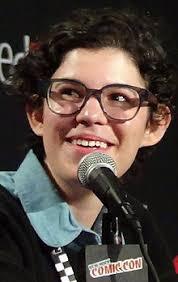
In the past she hasn’t taken good care of herself; she’s a workaholic and runs herself ragged—partly because she didn’t care about herself. The discussion of identity really helped her feel like she mattered, because before that she felt that no one would accept or care for her if she was honest about the feelings she had. If you don’t like your own love feelings, how can you like yourself?
She wondered how many people were in relationships that they accept that it defines who they are, and there’s a piece of their mind they never get to share.
Cameron discussed how having a partner isn’t the same thing as having an identity, though it’s sort of like a small business you cultivate together. There are a lot of lies we tell ourselves about how that relationship is supposed to feel and what aspects of it are normal. She brought up how people expect her to never want to meet her partner’s previous partners, to be jealous of them and angry they exist, while in actuality she was glad to be with someone who’d had other experiences before her and wasn’t “untouched.” Rebecca agreed that jealousy is romanticized, and Cameron said she’s loved people in a variety of ways.
Rebecca commented that partners shouldn’t be able to hold the keys to your identity. It can be dangerous, and you need to communicate. She mentioned loving the song “Darkness Among the Fireflies” by Mason Jennings—she’d never heard a song about a partner’s previous relationships. And then there’s a song by Emily King called “Distance” that’s about having space from your partner because you need to reboot, and then returning to them.
She loves these facets of love stories. She wants to tell those stories to kids, because she wanted to have them when she was young. All she had was love-at-first-sight stories that are always heteronormative and don’t make sense. They end when you get married, that’s it. Happily ever after. And then there are stories about how marriage is horrible! What does that tell kids.
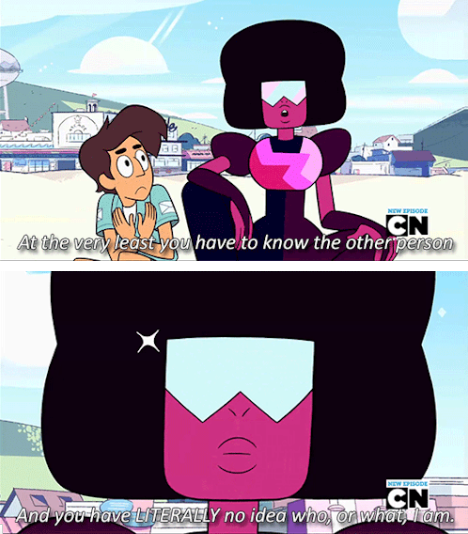
They discuss how you can dump energy into shame, and suppression is one of the only non-productive uses of energy. Cameron compliments Rebecca on creating a reality where she could go forward into having what she wants creatively without sacrificing attention to her identity that she needed for her health, and Rebecca says the alternative was unsustainable. She’s still dealing with it and has doubts about whether she should speak about these things. Cameron says she thinks the voice of doubt will go away.
Rebecca says she loves that the show helped people connect with other queer people or helped them come out. She met a teen at a book signing who is in the teen youth queer community, and she thinks it’s so wonderful—she loves that they feel good and don’t have to deal with what she dealt with since they have support from an early age.
She says people get excited about representation and how it will do people good, and they’ll want to support the show because of what it does for representation, but for her it’s not a commodity. It’s community.
She wanted to change the world, with putting her message into homes and reaching kids, and she loves that it can bring people into community, that it’s the people who matter more than the art.
When Rebecca stopped being afraid and started looking up info about bisexuality, she found out about Brenda Howard, the “mother of pride.” She popularized the term “pride,” and she’s bi and Jewish. She wished she’d had an opportunity to connect with role models like Brenda. Rebecca is still amazed that she’s part of a community like this, but Brenda helped create that space.
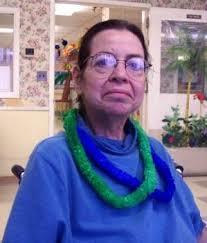
The end! I do wish I could chat with Rebecca. I’d love to have a talk like this and talk about queer experience, being a queer female Jewish creator, the importance of friendships, less scripted definitions of love, and the vital nature of children’s media. <3
No comments:
Post a Comment